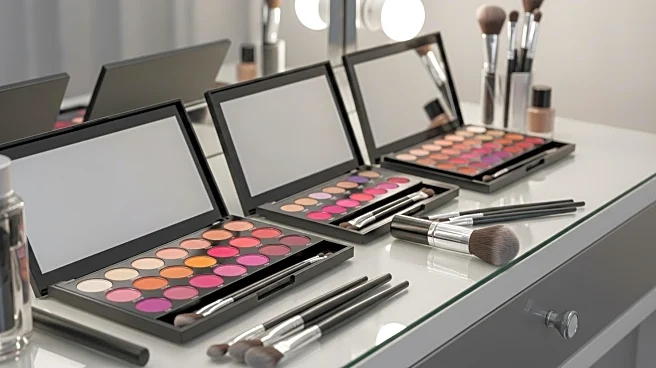What's Happening?
During President Trump's visit to the Knesset, Israeli makeup artist Yair Poliker had an unexpected encounter with the U.S. President. Poliker, who was initially at the Knesset to style journalist Ayala Hasson, ended up giving President Trump a quick makeup touch-up. The impromptu session involved using a transparent powder to neutralize the orange tone of Trump's skin and styling his hair for a uniform look. Poliker described the experience as the highlight of his career, noting the positive energy and smiles exchanged during the brief interaction. The makeup artist also shared a short conversation with Trump, thanking him for his contributions to Israel and the hostages, to which Trump responded with optimism about the future of the Middle East.
Why It's Important?
This encounter highlights the informal and human side of diplomatic visits, where unexpected interactions can occur. For Poliker, a well-known figure in Israeli celebrity circles, the chance to work with President Trump represents a significant career milestone. The event also underscores the importance of personal diplomacy and the impact of such interactions on public perception. Trump's visit to the Knesset and his remarks about a 'new Middle East' suggest ongoing diplomatic efforts and potential shifts in regional politics, which could have broader implications for U.S.-Israel relations and Middle Eastern geopolitics.
What's Next?
While the makeup session itself may not have long-term consequences, President Trump's visit to the Knesset and his comments about the Middle East could signal future diplomatic initiatives. Stakeholders in the region, including political leaders and civil society groups, may respond to Trump's optimistic outlook with varying degrees of support or skepticism. The visit could lead to further discussions on U.S. involvement in Middle Eastern affairs and potential policy shifts aimed at fostering peace and stability in the region.
Beyond the Headlines
The encounter between Poliker and President Trump also touches on cultural dimensions, illustrating how informal interactions can humanize political figures and create memorable moments that resonate with the public. Such events can influence public opinion and contribute to the narrative surrounding diplomatic visits, emphasizing the role of personal connections in international relations.









